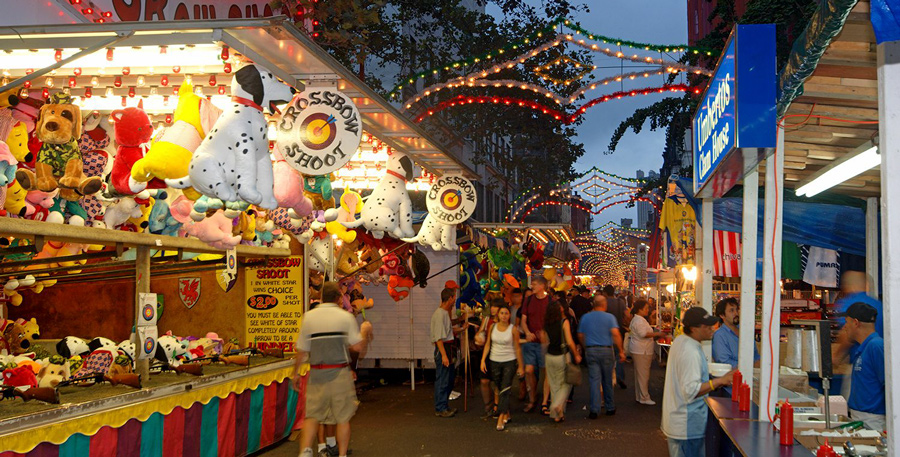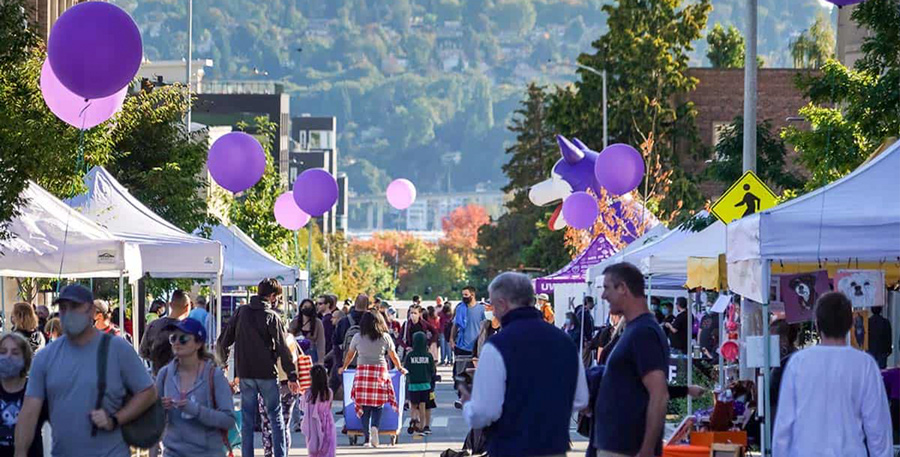12 Quick Tips for Planning a Street Fair
Street fairs, for some towns and cities, are extremely vital to the area’s local economy. From helping to promote local businesses to introducing new artists and food and drink vendors, street fairs are the perfect gathering spot for many communities all around the world.
If you are planning a street fair as an event coordinator, there are a few tips to remember that can help to streamline the planning process from start to finish.

1. Set Location and Time(s)
The location of your street fair venue is one of the biggest decisions you will need to make as a street fair event organizer.
The right location can mean the difference between a successful turnout and turning prospective guests away from attending at all. If you are unsure about where to plan to host your city’s next street fair, consider other local fairs in your area and venues they typically rent or use.
Other things to consider:
- Parking options or close to public transportation
- Community event calendar/upcoming events
- Permits required for that venue, especially if it's blocking off a street
- Space - is there enough space for guests and vendor booths
2. Budget Development
As with any event, as a coordinator, you are also responsible for sticking to any budget that has been set in place.
Working within a certain budget is imperative as an event coordinator, whether you use the funds for marketing campaigns, local outreach, or even for the physical setup of entertainment and activities you intend to provide during the street fair itself.
3. Licensing and Permits
You may require permission from the city and permits to block off city streets if you intend to host your street fair outdoors and near busy streets and/or intersections.
Always check with your local city municipal department to inquire about permits, licensing, and restrictions that may be in place in your city or county.
Some permits to consider include:
- Permits required for vendors
- Special or temporary events permit
- Business license
- Temporary activities or structures
4. Event Theme/Branding Creation
Although a street fair may include an array of vendor types, artists, and cooks, you can also choose an event theme or implement the branding of your own business if you are hosting the street fair as a corporate sponsor.
Using event themes can be extremely appealing to locals, especially if the theme is relevant or is more likely to resonate with the residents in the area.
5. Recruit Staff and Volunteers
Recruiting staff and volunteers for a street fair is highly recommended.
Use both local businesses and social media groups or pages to request staff and volunteer help throughout the street fair for discounts, booth space, or additional street fair perks.
You can also use an event registration platform such as Purplepass to help facilitate the volunteer registration process of those who are interested in lending a helping hand.
6. Create an Event Registration Page
Create an event registration page to manage the ticket sales of your street fair digitally and in one central location. With a solution such as Purplepass, easily sell street fair tickets, merchandise, and even discounted tickets to live events or entertainment during the fair in one central location.
Top benefits of selling tickets online include:
- A dedicated page for your event info, directions, sponsors, media, and ticket sales
- Sell more than just tickets; merchandise, concessions, ticket add-ons
- Collect payment online, in advance
- Minimize wait times and long lines with advance ticket sales
- Vendor and volunteer signups can also be done with a registration online
- Accurate reporting, invoices, and statements for accounting
7. Vendor/Sponsorship Pages
Create vendor and sponsor pages using your official website or event registration page.
Showcasing your street fair’s vendors and sponsors can encourage more to sign up and to reserve their own spots as quickly as possible, especially if space is advertised as limited.
8. Website Planning and Layout Design
Build a website and plan a layout design that is accessible and responsive, especially for mobile users.
The easier it is to access a website about a street fair to find more information about the event, the more likely individuals are to attend, especially if they feel fully knowledgeable about what the street fair offers.
Tips for building an effective website:
- Make sure it is mobile friendly
- Embed your registration onto the website to avoid redirects and third parties
- Avoid using crazy fonts, bold, italics, random colors, etc. You want to remain consistent
- Don't be shy! Show off your event with media, videos, highlights, reviews
9. Coordinate With Vendors and Local Talent
Work together with local vendors and talent to verify that everyone is aware of the rules of the street fair, the date, and location of the street fair, as well as of any requirements or safety and health restrictions that may already be in place.
10. Coordinate With Volunteers
Coordinate with volunteers to ensure that everyone is on the same page. Share fair map keys, guidelines, and rules for all volunteers before the day of the street fair arrives. It is also strongly advised, especially for larger events, to host a volunteer orientation prior to the event.
Also, make sure your workers are easy to identify with name tags and/or event shirts.
11. Offer Merchandise for an Additional Revenue Stream
One of the best ways to increase revenue for those who are coordinating and hosting street fairs is to offer merchandise of their own. Offering city or street fair-themed merchandise as the official coordinator or sponsor of the fair event itself is a great way to create an additional stream of revenue.
12. Execute Your Marketing Strategy
Executing your marketing strategy is also key to helping spread the word about any upcoming street fair, regardless of how many vendors you have accepted.
Work with a marketing team to discuss potential promotional opportunities and the best marketing methods that are right to promote your street fair based on your location and the demographics you are trying to reach, both online and off.

Preparing for the Street Fair
One Week Out
A week before the street fair you are planning is due to begin, be sure to check your event’s timeline to ensure that everything is in order, on time, and within any budget you have set. Reviewing the timeline of your street fair’s schedule a week out from the event provides time to tie up loose ends that may require more attention or detail.
The Day Before
The day before the street fair begins, it is important to
- conduct test runs
- run equipment checks
- ensure that all of your registration platforms, sites, and equipment are also in working order
- run through your street fair’s rules, guidelines, and specifications with any staff or volunteers who will work during the street fair the day before
- set up decorations
- vendor tents
-
marketing materials can also be done the day before the street fair will begin
Planning a successful street fair can be done with a bit of planning and with the right tools, such as an event ticketing solution such as Purplepass. With the right tools, resources, and planning process in place, host a street fair of any size year-round, knowing you will have the maximum turnout possible, every time.






